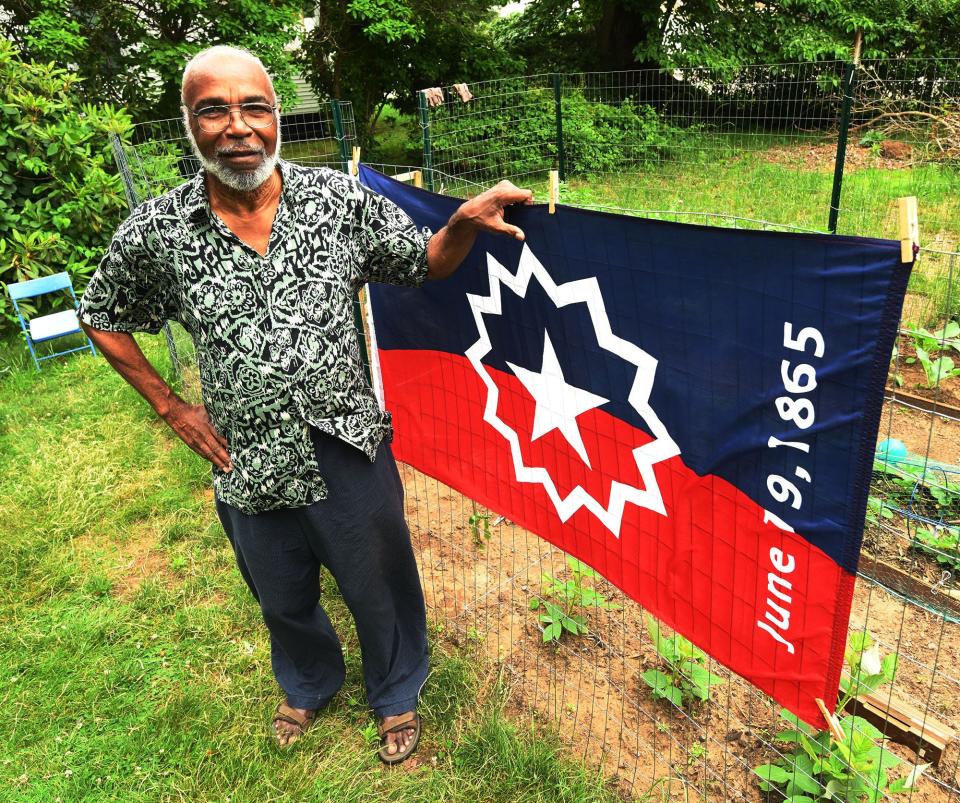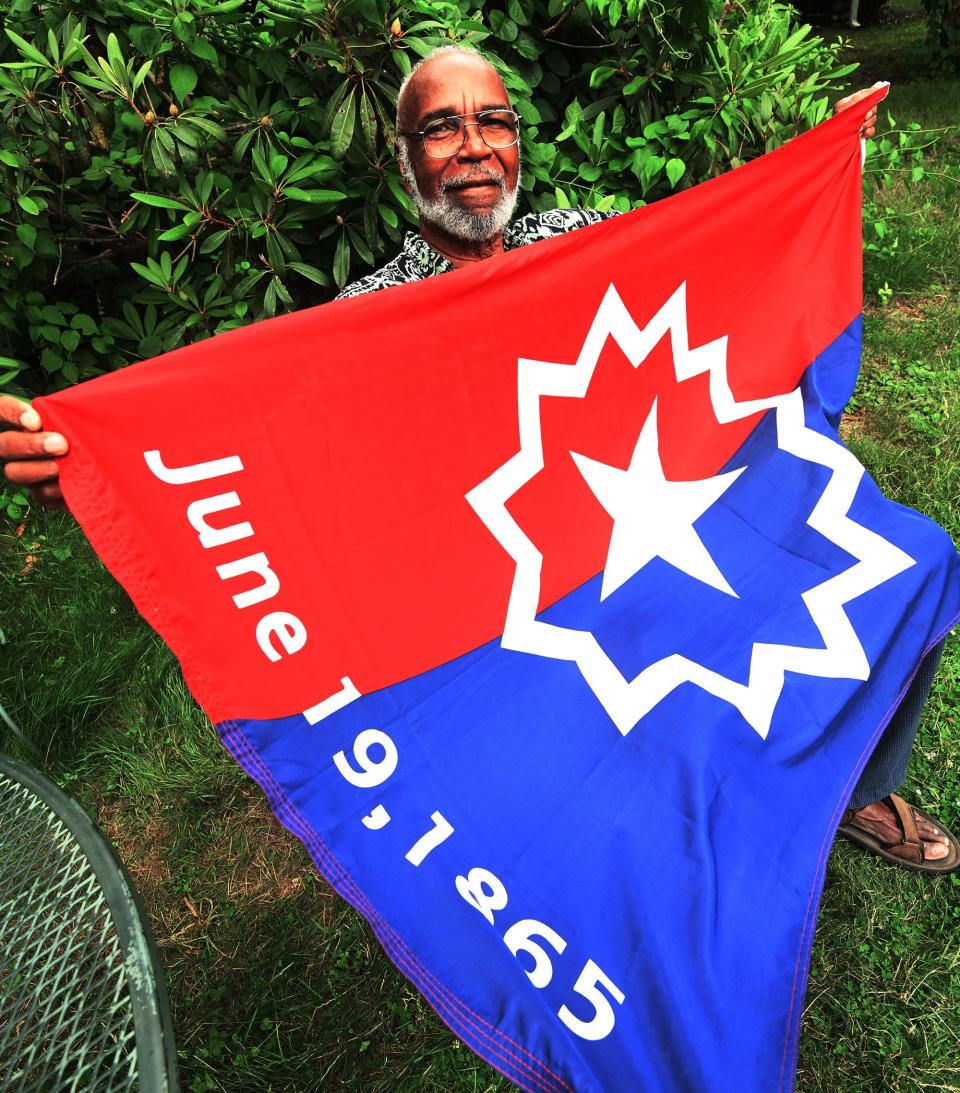A Q&A with Ben Haith, the man who designed the Juneteenth flag. He lives in Norwich.
- Oops!Something went wrong.Please try again later.
Norwich resident Ben Haith created the Juneteenth flag in 1997, and helped over the years to increase awareness and recognition of the holiday. The Bulletin spoke with Haith on Wednesday about his life, his advocacy for Juneteenth and other causes, and about what’s next. The following has been edited for conciseness and clarity.
Q: I know you were born in Connecticut, but how did you end up in Boston?
Haith: From Stamford, I went to school in Ohio. From there I left and went to Los Angeles. From Los Angeles, I went into the U.S. Army. The Army sent me into Europe, into Germany and back to New York. I spent six years in New York City and I didn’t feel like I was accomplishing anything. I stopped in Boston a couple of times, and I thought it’d be a nice place for me to move to, so I did. A lot of things happened, but the most positive thing was that I got married and had a family. I’m still enjoying my family in Connecticut.

Boston helped me find a purpose in life. I ended up becoming a community activist, working with many organizations and elected officials to reduce crime in many neighborhoods in Boston. I’ve been an anti-crime, anti-violence activist for years, and I still try to help with public safety, particularly violence. I just can’t walk away from the issue; I do what I can online, communicating with different people.
Q: How did you get involved in anti-crime activism?
Haith: There was a huge blizzard in 1978. The city of Boston started dumping a lot of snow in our recreation park. For whatever reason, I didn’t like what they were doing. I talked to like-minded neighbors and we organized and we went to the park. We were opposed to any further dumping. Someone from the social service agency saw me there with the neighbors, and he referred me to another social service agency; a federally-funded anti-crime program, one of the first in the country. So I became one of the advocates for the anti-crime program, so it launched me into community activism.
Juneteenth in NorwichNorwich has a long history with Juneteenth. How will the city celebrate in 2022?
Q: What other forms of activism have you been a part of over the years?
Haith: What I was making a living doing was social work. I was a case manager for senior citizens for a few years. At the end, I was working for homeless veterans in Boston. We have an institution called the New England Center for Homeless Veterans, and they help veterans from all over the country. It was quite an experience.
Q: There was a 1985 article from the Boston Globe where you were quoted as being against a gay couple having foster kids. Can you speak to that?
Haith: Our country is in transition. It was a different climate, so to speak. Right now, what we’re going through is social change. Sometimes, you’ve got to get out of the way of it, so that’s what I’ve done. I’m not in the way of any group of people trying to improve their lives. I’m trying to improve the lives of people impacted by violence, that’s primarily what my interest is right now. When you move on in life, things change, so maybe I’ve become more philosophical than I used to be. It’s just a learning process.
Pride MonthA Pride flag won't fly on Norwich City Hall this June. An alternative is in the works.
Some people dig in and lock themselves, and they don’t see what they can do to make life better. They want to hold on to the past. I don’t want to be a person like that.
Q: When did you first hear about Juneteenth?
Haith: I heard about it when I was a youth, visiting my aunt in Virginia. I heard the word and it somehow stayed in my memory. When I heard it in Boston, I said it’s something I better look into. It turns out more people were aware of Juneteenth in the south than in the north.
Q: Why were you inspired to advocate for Juneteenth?
Haith: When I was in New York City, I was working for several advertising and marketing agencies. I acquired some skills that stayed with me after I left. That experience in New York made me realize Juneteenth needed a symbol.
Talking about race in Norwich'You sometimes have to start something big.' How has Norwich met racism and inequity?
What’s happening with Juneteenth is much larger than me; I’m just a small part of it, and I appreciate people’s thanking me about designing the flag, which represents something much larger than itself. It’s a flag about humanity. It’s a flag about people who accomplished a lot, even though they went through a lot. Hopefully, people will start thinking about Juneteenth throughout the world, to help bring peace to our world. I want to get that message to the United Nations.
I also want to restore peace to African-Americans. I grew up in a time when we didn’t have the kinds of behavior we’re experiencing now. We’re a people that used to love and care for each other. Just enough of us have lost our way where we have to do something about it.
Q: What is the meaning in the design?
Haith: I say “That’s a Juneteenth Star,” but it means other things as well, like the Lone Star of Texas, which they also have on their state flag. The red white and blue represents our national flag. The flag also represents a new people, with the star bursting out. The red curve represents the star rising into the heavens, where the other stars are in the blue. We all belong to the universe.
Plainfield, CT cyberattackIn March, Plainfield fell to a cyberattack. Now the town has a plan to stop the next one.
Q: What was the importance of your work with Dr. Ronald Meyers?
Haith: Dr. Meyers was instrumental in making Juneteenth a national holiday. Unfortunately, he’s deceased. He had an organization, the National Juneteenth Observance Foundation. He was working with people through the country, promoting the holiday. He and his wife Sylvia called me one day, and he said he’d like to use the flag I put together to be a part of his organization. I agreed that he could and the rest is history.
When the organization had use of the flag, they used it as a means to raise money to help make Juneteenth a holiday. I was happy that the flag helped.
People in Washington were aware that there was a movement to make Juneteenth a holiday because of his organization, and I became a part of it, as a state affiliate and as a consultant.
Q: When did you come to Norwich and why?
Haith: In 2008 I moved here from West Wareham, which is the gateway to Cape Cod. I’m a veteran, and I had to go too far to get the services that I needed, plus I was dealing with psychological issues and I needed to go somewhere less congested.
Veterans in CTVeterans don't always get the care they've earned. A 'stand down' day looks to fix that.
I’ve been able to go to the veteran’s health clinic in New London. I’m able to go to the V.A. hospital in West Haven. Before that, I was getting mental health help at Backus Hospital, being a part of group therapy. I had some issues that I had to have addressed, and it looks like I’m better off than I was before I moved here.
Q: As someone who lived in many areas in the Northeast, what do you think of Norwich?
Haith: The people get along, and one of the things I wanted to get away from is crime. Norwich has helped me improve my life in a quiet way. I’m happy where I am right now living in a three-generational household; my wife and I, my son and his wife, and the two children.
I listen to the talk radio here. They’ve gotten to know me, I’ve gotten to know some of them. I couldn’t ask for a better place to live in.

Q: How do you feel that you’re receiving the Dan Jenkins Memorial Award during Norwich’s Juneteenth ceremony and flag raising?
Haith: I’m honored already that this is my hometown now. I’ve gotten to know a number of people, they’ve gotten to know me. I’m overwhelmed with what is happening with Juneteenth this year, and that I’m being included.
A Day in the LifeProfessional mini golf? Yep, it's real. Meet the Norwich couple who play competitively.
Q: What’s next for you?
Haith: Whatever God wants me to do. I know I’m very interested in peace. I believe that’s what everyone wants. Humanity has come to that point in history where we can’t continue fighting. I connect the bullets coming from these handguns to these missiles, a larger version of a bullet.
What is it about people that they want to permanently injure someone or take their life with weapons. What gives them the right to take someone else’s life? The life is not theirs.
This article originally appeared on The Bulletin: From Boston to Norwich, Ben Haith has supported Juneteenth cause

